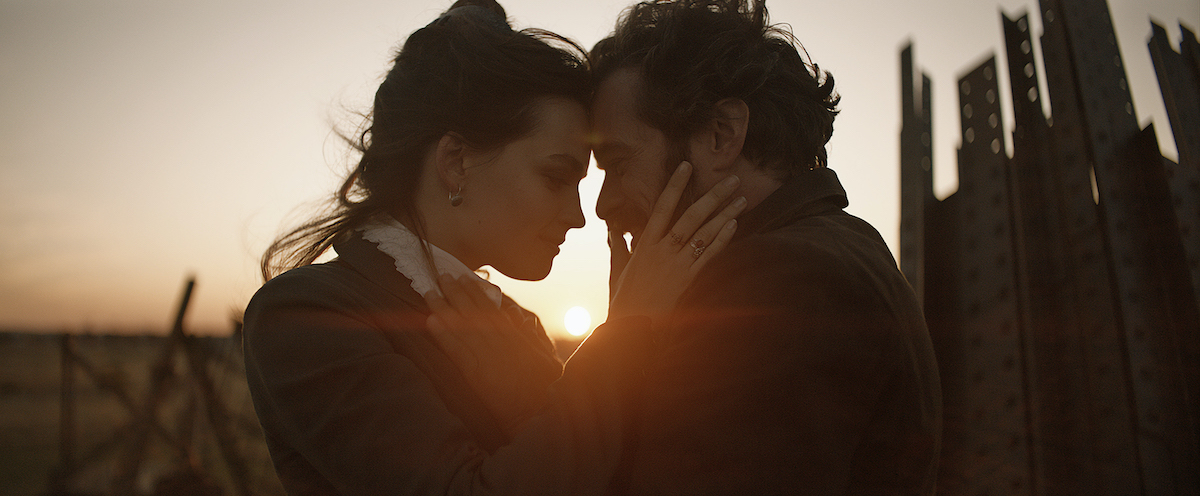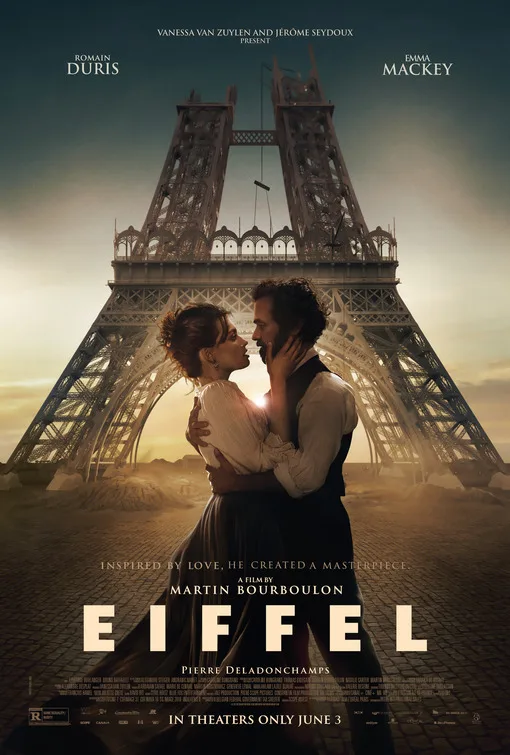You might think that a movie about the construction of one of the most iconic structures in the world would be carefully put together. But that is not the case with the sumptuous, often frustrating “Eiffel,” the story of a man whose name is as joined to the Tower emblematic of Paris as the 133-year-old beams that are still sturdily riveted (not bolted) together.
There is no surprise in this story about whether Eiffel can overcome bureaucratic, engineering, and financial problems to get it built, with even the Pope objecting because it would overshadow the Notre Dame cathedral. The Eiffel Tower has been visited by more than 300 million tourists and is as indispensable an element in the establishing shot of any Parisian story as someone carrying a baguette home for dinner or bal-musette music on the soundtrack.
In the first moments of the film we go from Gustave Eiffel (a magnetic Romain Duris) sketching the tower and envisioning a future ceremony celebrating its opening to three years earlier. In a misguided attempt to add some suspense to the story, the movie continues to hop back and forth in time, with scenes of a fictional thwarted love story between Eiffel and the daughter of a wealthy family named Adrienne (the enticingly sloe-eyed Emma Mackey). As attractive as the couple is, those scenes do not have the dramatic impact they are intended to. Instead, they are a distraction from the more interesting story of the many obstacles the tower’s construction had to overcome. A note just before the credits trying to tie the Tower to Adrienne more directly is overkill in large part because, see above, the love story is made up.
Though he was not the sole designer of the Tower, Eiffel and the true story of its construction are plenty interesting enough to fill a movie, especially one as sumptuously designed as this one, with fine work from cinematographer Matias Boucard. The scenes of designing and building the Tower are genuinely powerful, and even if we know it will be built, it is worthwhile to be reminded what made it consequential before it was the site of innumerable Instagram posts. Eiffel, already well established for his bridges, was even granted honorary American citizenship for his work on France’s gift to the United States, the Statue of Liberty. The sculptor was Frédéric Auguste Bartholdi, but it was Eiffel and the staff of his engineering company who created the interior structure that kept her standing and kept her torch held high. He was initially not interested in building a tower that was originally intended as a temporary structure for the entrance to the 1889 world’s fair. “I want to build a Metro, not a monument,” he says. And there were many other people who were not interested in his building it. The story deserves better than a character yelling “It’s madness!” at Eiffel.
Of course he finally decides to do it, with a vision of an edifice taller than the Washington Monument, “France’s revenge on history.” He insists it must be open to everyone, regardless of class or wealth. He is eloquent and inspiring when appearing before financiers: “I am merely a man with an idea grander than myself. I ask only that you let me breathe life into it.” And again, when he speaks to the exhausted and underpaid workers, with his version of a St. Crispin’s Day speech, telling them that it is their tower, not just his. The scenes of the construction itself are very well staged, and because we have seen Eiffel explain the ingenious watertight metal caissons and injected compressed air he used to secure the tower, we are glad to see how they work.
But that keeps being interrupted by the less interesting scenes of the romance, with the over-familiar storyline of disapproving parents who think he is not good enough for their daughter and the less familiar-and-should-remain-so musical chairs birthday party game. Duris and Mackey set off some sparks, especially during a dance with steps matching the back-and-forth of their conversation, but while we do not find out until late in the film what prevented them from being together, their story does not add sufficient drama to make the wait worthwhile. “Eiffel” tries to be a Francophone version of “Shakespeare in Love.” Yet while that historical film also took great liberties with a romantic storyline, its love story informed the main character as he shaped his play and underscored the underlying themes of the film. “Eiffel” is only a flimsy fantasy retcon in comparison.
Now playing in theaters.




















